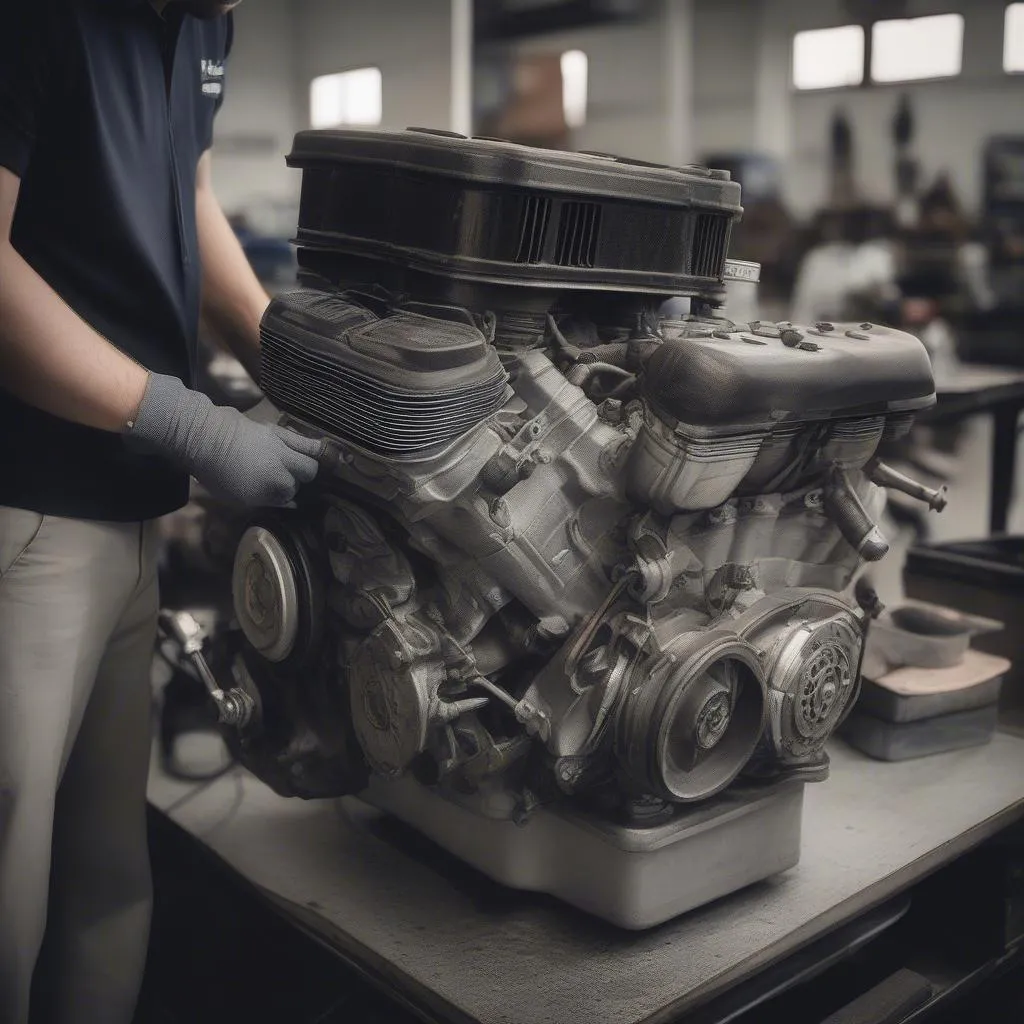Is your Mercedes Benz E350 displaying a “Brake Reduction Power” warning and leaving you feeling uneasy about your safety on the road? Don’t panic! This is a common issue, and understanding the problem along with its potential solutions can save you time, money, and stress.
This comprehensive guide will walk you through the potential causes, symptoms, and repair costs associated with fixing the brake reduction power issue on your Mercedes Benz E350. Let’s get started!
Understanding “Brake Reduction Power”
Before diving into the specifics, it’s crucial to understand what this alarming warning message actually means. In simpler terms, “Brake Reduction Power” indicates that your car’s braking system isn’t functioning at its full potential. This could be due to various reasons, from a minor sensor malfunction to a more serious issue with the braking components.
What Causes Brake Reduction Power on a Mercedes Benz E350?
There are several potential culprits behind this issue. Here are some of the most common causes:
1. Brake Assist System Malfunction: The brake assist system is designed to provide maximum braking force in emergency situations. A malfunction here could trigger the warning message.
2. Faulty Wheel Speed Sensor: Your E350 uses sensors to monitor the speed of each wheel. If a sensor sends inaccurate information, it can disrupt the braking system.
3. Brake Fluid Leak: Brake fluid is the lifeblood of your braking system. A leak can significantly reduce braking power and activate the warning.
4. Worn Brake Pads or Rotors: Over time, brake pads and rotors wear down, diminishing their ability to generate friction and slow down your vehicle effectively.
5. Electrical Issues: A problem with the wiring or electrical components within the braking system can also lead to this warning.
mercedes-benz-e350-brake-system|Mercedes Benz E350 Brake System|A close-up view of the complex brake system components in a Mercedes Benz E350, showcasing the brake calipers, rotors, and brake lines.
Recognizing the Symptoms
Identifying the issue early can prevent further damage and costly repairs. Here are some telltale signs that your Mercedes Benz E350 might be experiencing brake reduction power problems:
- Illuminated Brake Warning Light: The most obvious sign is the “Brake Reduction Power” warning message on your dashboard.
- Reduced Braking Force: You may feel like you have to press the brake pedal harder than usual to slow down or come to a complete stop.
- Spongy Brake Pedal: A soft or spongy brake pedal that sinks closer to the floor can indicate air in the brake lines or a brake fluid leak.
- Unusual Noises When Braking: Grinding, squealing, or scraping noises when applying the brakes can signal worn brake pads or rotors.
- Pulling to One Side While Braking: This could be a sign of uneven brake pad wear or a problem with the brake calipers.
brake-warning-light-dashboard|Brake Warning Light on Dashboard|A car dashboard illuminated with a bright red brake warning light, signaling a potential issue with the brake system.
Essential Equipment for Diagnosis and Repair
- OBD-II Scanner: This tool allows you to read diagnostic trouble codes stored in your car’s computer, which can pinpoint the root cause of the problem.
- Digital Multimeter: This helps check the voltage and resistance of various components within the braking system.
- Brake Fluid Tester: This tool checks the condition of your brake fluid and determines if it needs replacement.
- Basic Hand Tools: Wrenches, sockets, screwdrivers, and pliers are essential for accessing and replacing brake components.
mechanic-diagnosing-car-brake-system|Mechanic Diagnosing Car Brake System| A mechanic in a professional garage using an OBD-II scanner to diagnose problems with a car’s brake system, connecting the scanner to the car’s diagnostic port.
Troubleshooting and Repair Options
1. Professional Diagnosis: While it’s possible to troubleshoot some issues yourself, it’s highly recommended to take your E350 to a qualified mechanic, especially for brake-related problems. They have the expertise, tools, and experience to diagnose and repair complex braking systems safely.
2. Common Repairs: Depending on the diagnosis, the mechanic might perform one or more of the following repairs:
-
Replacing Faulty Sensors: If a wheel speed sensor is the culprit, replacing it will resolve the issue.
-
Repairing Brake Fluid Leaks: Locating and repairing any brake fluid leaks is crucial to restoring braking power and preventing further damage. This may involve replacing brake lines, calipers, or other components.
-
Replacing Brake Pads and Rotors: Worn brake pads and rotors should be replaced as a set to ensure optimal braking performance.
-
Addressing Electrical Issues: Any problems with the wiring, connectors, or control modules related to the braking system will need to be addressed by a qualified technician.
FAQs about Mercedes Benz E350 Brake Reduction Power
Q1: Can I still drive my car with the “Brake Reduction Power” warning on?
A: It’s highly discouraged. Driving with reduced braking power significantly compromises your safety. It’s best to have your vehicle towed to a qualified mechanic immediately.
Q2: How much does it cost to fix the brake reduction power issue on a Mercedes Benz E350?
A: The repair cost can vary widely depending on the underlying cause, the cost of parts, and labor rates in your area. It’s always best to get a detailed quote from a reputable mechanic after a proper diagnosis.
Q3: Are there any preventative measures I can take to avoid this issue?
A: Yes, regular maintenance is key to preventing brake problems. This includes:
- Following the manufacturer’s recommended brake fluid flush intervals
- Having your brakes inspected annually or as recommended in your owner’s manual
- Addressing any brake-related warning lights promptly.
Cardiagtech for Efficient Diagnosis
Accurate diagnosis is crucial for efficient and cost-effective repairs. Consider using a reliable automotive diagnostic tool like those offered by CARDIAGTECH. These tools can help you identify the root cause of the brake reduction power issue, saving you valuable time and potentially reducing repair expenses.
Conclusion
Experiencing brake reduction power in your Mercedes Benz E350 can be concerning, but understanding the issue and addressing it promptly is vital. By following the information provided in this guide and seeking professional assistance, you can ensure your safety on the road and keep your Mercedes Benz running smoothly.


